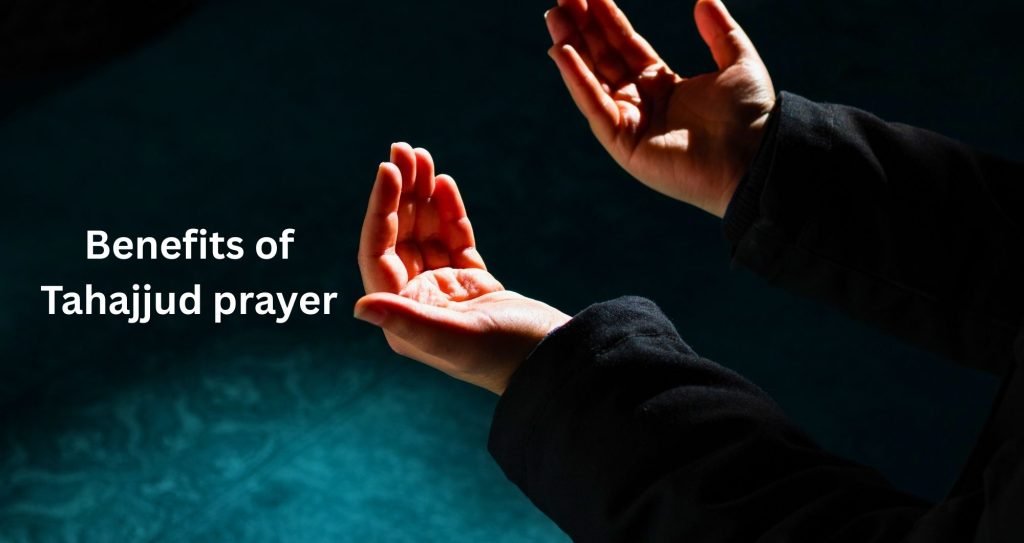There’s something profoundly calming about waking up in the last part of the night. When everything is quiet, and the world is asleep, I find myself closest to Allah. That’s the time I pray Tahajjud. It’s more than a ritual for me—it’s a source of strength, clarity, and peace. In this blog, I’ll share everything I’ve learned about the Benefits of Tahajjud Prayer, its meaning, how to pray it, and why it might change your life too. If you’ve ever searched for peace, purpose, or personal transformation, then keep reading. This sacred prayer might be your answer.
What Is Tahajjud Prayer?
Tahajjud is a special, voluntary night prayer performed after the obligatory Isha prayer and before the break of dawn (Fajr). More than just a spiritual routine, it’s a profound act of devotion that holds countless benefits for the soul. The benefits of Tahajjud prayer are deeply rooted in both spiritual and emotional transformation, and it was a consistent and beloved practice of our Prophet Muhammad ﷺ.
The term “Tahajjud” literally means to rise after sleep. That’s why, traditionally, it is preferred to rest for a while before waking up again to pray. This brief sleep is not just a physical reset—it symbolizes a break from the world to consciously return to Allah, seeking closeness and renewal.
The Timing of Tahajjud
When it comes to timing, not all hours of the night are the same. The most blessed time to perform the Tahajjud prayer is during the last third of the night. This sacred window is when Allah, in His unmatched mercy, descends to the lowest heaven. He listens closely, responds to supplications, and forgives sins in abundance.
Moreover, it is during this quiet, still time that the heart feels most present, and the mind finds the least distractions. It becomes a deeply personal moment to reconnect with the Creator. Hence, the benefits of Tahajjud prayer are not only spiritual but also emotional—bringing peace, clarity, and a sense of inner calm that lasts throughout the day.
Powerful Benefits of Tahajjud Prayer
The Spiritual Benefits of Tahajjud
- Building a Personal Connection with Allah: When I wake up and pray Tahajjud, I feel like I’m speaking directly to Allah. There’s no rush, no distractions—just me and Him. It’s during these intimate moments that I pour out my heart, ask for help, seek forgiveness, or simply express gratitude. This solitude nurtures a deep spiritual connection.
- Strengthening My Faith (Iman): Tahajjud has helped me grow spiritually. It’s not just about performing extra rakats. It’s a conscious decision to draw closer to my Creator. It reminds me that I’m making an effort to improve, and that kind of commitment fortifies my Iman every day.
- Inner Peace and Reduced Stress: Whenever life becomes overwhelming, Tahajjud brings me peace. I’ve noticed a significant reduction in my anxiety and stress after making it a habit. There’s something profoundly healing about crying in sujood when no one else sees or hears.
- Clarity in Decision-Making: Many of the best decisions I’ve made followed a heartfelt Tahajjud prayer. Whether it’s a personal matter, career move, or life-changing choice, I find my mind clearer and more focused after those peaceful early morning moments.
- A Powerful Time for Dua: Tahajjud is considered the ultimate time to make dua. I often ask for things that feel out of reach during this prayer. And more often than not, I’ve seen those duas answered in ways I never imagined. It strengthens my belief in the power of sincere supplication.
Health and Psychological Benefits of Tahajjud
- Improved Sleep Quality: Ironically, waking up for Tahajjud has improved my overall sleep. The habit of sleeping early, resting deeply, and then waking with intention adds balance and structure to my night.
- Enhanced Mental Strength and Focus: Starting my day with Tahajjud gives me a mental edge. It boosts my discipline and willpower. I notice that I’m more productive, calm, and focused throughout the day. It sharpens my mind and helps me stay aligned with my goals.
- Emotional Healing and Resilience: Tahajjud has been a form of therapy for me. During times of grief, heartbreak, or failure, this prayer gave me inner strength. Talking to Allah during those quiet hours mended emotional wounds that nothing else could touch.
Scientific Benefits of Tahajjud Prayer
While Tahajjud is deeply spiritual, it also brings surprising health and wellness benefits backed by science. From reducing stress to improving sleep, the scientific benefits of Tahajjud prayer reveal how this night worship supports the body, mind, and soul in harmony.
Key Scientific Benefits of Tahajjud Prayer:
- Reduces Stress and Anxiety
- Waking up in the last third of the night helps lower cortisol levels.
- Creates a calming effect, reducing anxiety and emotional tension.
- Boosts Mental Clarity
- Engaging in silent reflection activates the brain’s focus and emotional control centers.
- Enhances concentration, mood, and inner peace.
- Improves Sleep Quality
- Regulates the body’s circadian rhythm and increases melatonin levels.
- Leads to deeper, more restful sleep over time.
- Supports Heart Health
- Movements in prayer improve blood flow and regulate blood pressure.
- May reduce the risk of cardiovascular problems with regular practice.
- Builds Discipline and Productivity
- Encourages a strong routine and time management skills.
- Leads to increased motivation and a more purposeful lifestyle.

How to Pray Tahajjud
Step-by-Step Guide:
- Intention (Niyyah): Set a sincere intention to wake up and pray.
- Sleep: Sleep for a portion of the night.
- Wake Up: Ideally during the last third of the night.
- Make Wudu (Ablution): Refresh yourself physically and mentally.
- Pray 2 Rakats (Minimum): You can pray 2, 4, 6, 8, or more—always in pairs.
- Make Dua After Prayer: Speak from your heart. Ask for whatever you need.
You can read this post for a detailed guide on Tahajjud Prayer.
Is Witr Part of Tahajjud?
Yes. Witr is prayed after Tahajjud and before Fajr. If you’re planning to wake up for Tahajjud, it’s best to delay Witr until after those rakats.
Practical Tips to Wake Up for Tahajjud
- Sleep Early: Go to bed right after Isha.
- Set Multiple Alarms: Place them far from your bed.
- Dua Before Sleeping: Ask Allah sincerely to wake you up.
- Start with Small Steps: Begin with just two rakats.
- Find Your Why: Reflect on your reason for praying Tahajjud.
Qur’anic Verses and Hadith on Tahajjud
- “وَمِنَ الَّيْلِ فَتَهَجَّدْ بِهٖ نَافِلَةً لَّكَ ۖ عَسٰۤي اَنْ يَّبْعَثَكَ رَبُّكَ مَقَامًا مَّحْمُوْدًا” And during the night, wake up for Salāh of tahajjud , an additional prayer for you. It is very likely that your Lord will place you at Praised Station. (Surah Al-Isra’ 17:79)
- “يٰۤاَيُّهَا الْمُزَّمِّلُ ۙ قُمِ اللَّيْلَ إِلَّا قَلِيلًا نِّصْفَهُ أَوِ انقُصْ مِنْهُ قَلِيلًا أَوْ زِدْ عَلَيْهِ وَرَتِّلِ الْقُرْآنَ تَرْتِيلًا” O you, wrapped up in clothes, Stand [in prayer] through the night, except for a little; Half of it, or subtract from it a little, Or add to it, and recite the Quran with measured recitation. (Surah Al-Muzzammil 73:1-4)
- أَفْضَلُ الصِّيَامِ بَعْدَ رَمَضَانَ شَهْرُ اللَّهِ الْمُحَرَّمُ وَأَفْضَلُ الصَّلاَةِ بَعْدَ الْفَرِيضَةِ صَلاَةُ اللَّيْلِ ” ” Abu Haraira (Allah be pleased with him) reported Allah’s Messenger (ﷺ) as saying: The most excellent fast after Ramadan is God’s month. al-Muharram, and the most excellent prayer after what is prescribed is prayer during the night. (Sahih Muslim, 1163)
Why Everyone Should Try Tahajjud
You don’t have to be perfect to begin. In fact, that’s the beauty of Tahajjud—it welcomes you exactly as you are. You also don’t need to commit to an entire hour of prayer right away. Instead, start small. Just two rakats can be enough to feel its transformative power. Gradually, as you begin to experience the calm and connection it brings, you’ll naturally want to come back for more. Over time, you’ll notice how this simple act strengthens your faith, eases your heart, and brings clarity into your life. So why not try it once? Just once. You might be surprised by how deeply it touches your soul.
Final Thoughts
In the end, Tahajjud isn’t just about prayer—it’s about presence. It’s a divine gift, a sacred moment where Allah calls out to you while the world sleeps. It’s your exclusive appointment with the One who knows your pain, hears your silent pleas, and holds the solutions to every burden you carry. Even if it’s just one rakat, even if your eyes are still half-closed from sleep—show up. Trust that those quiet, whispered moments in the dark can bring more light into your life than anything else. So begin tonight. Not tomorrow. Not when you’re “ready.” Let it be tonight. Let this small step open the door to a new level of peace, purpose, and connection with your Creator—just as it did for me.
FAQs About Benefits of Tahajjud Prayer
1. What is the best time to pray Tahajjud?
The last third of the night is the most recommended and spiritually rewarding time.
2. How many rakats should I pray for Tahajjud?
You can start with 2 rakats and increase gradually—most people pray between 2 to 8 rakats.
3. Can I pray Tahajjud without sleeping first?
Yes, but sleeping first is the traditional and recommended practice.
4. Is Tahajjud obligatory in Islam?
No, it is a sunnah prayer, highly recommended but not obligatory.
5. Do I need to pray Witr after Tahajjud?
Yes, if you haven’t prayed Witr already, it’s best to pray it after Tahajjud and before Fajr.
6. Can I make dua in my own language?
Absolutely. After finishing the prayer, you can speak to Allah in your native language. Read this Tahajjud Dua.
7. How do I build a habit of praying Tahajjud?
Start small, stay consistent, and make dua for Allah’s help in maintaining the practice.
8. Does Tahajjud bring barakah to life?
Yes, many find it brings blessings in work, family, health, and spirituality.
9. Can women pray Tahajjud at home?
Yes. Women can and should pray Tahajjud in the comfort of their homes.
10. Is there a specific surah to recite in Tahajjud?
There’s no fixed surah. You can recite any portion of the Qur’an you know well.


